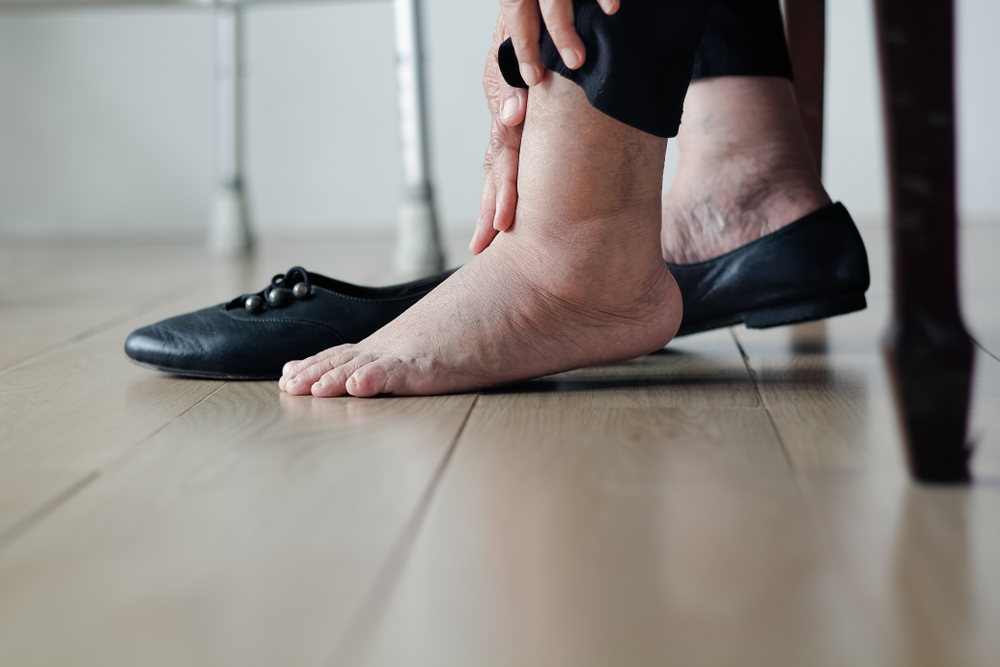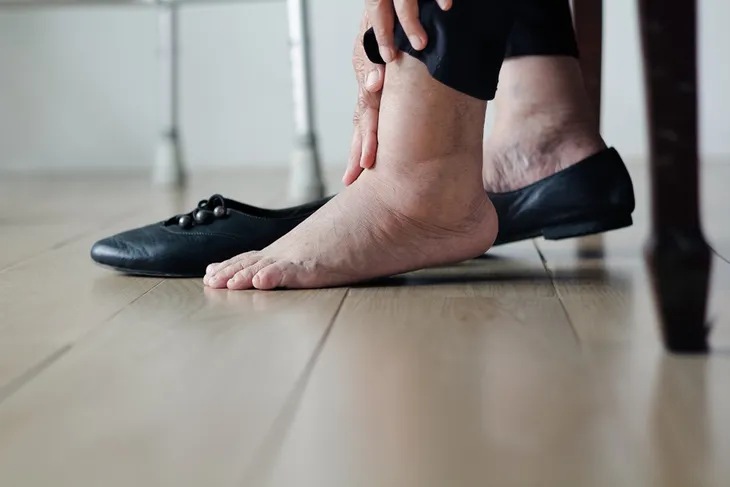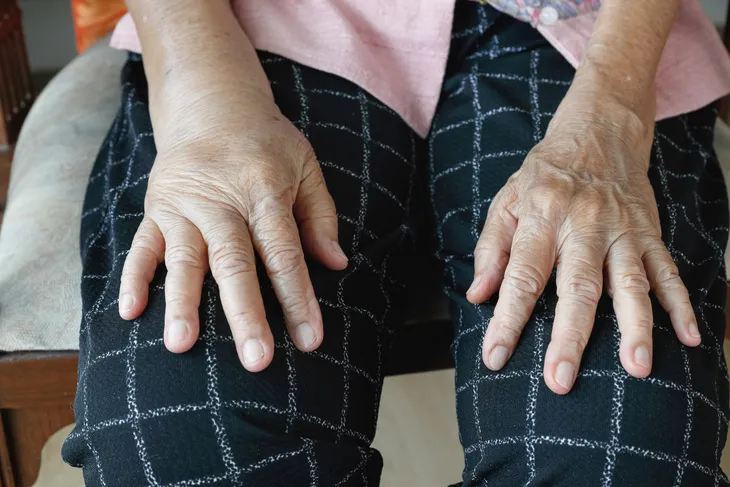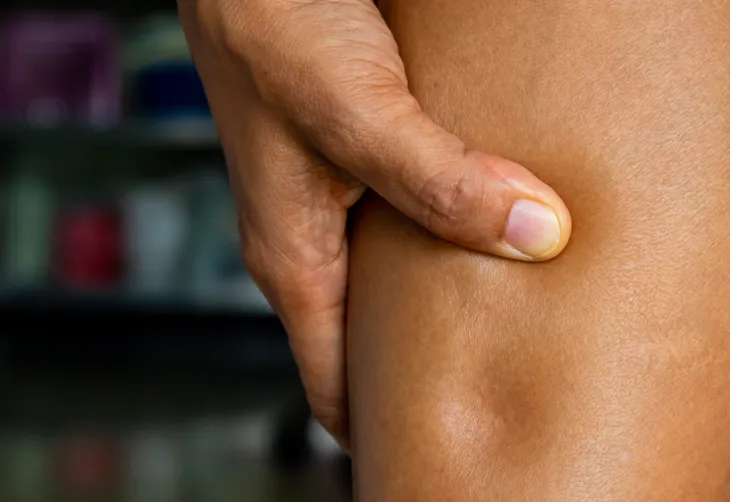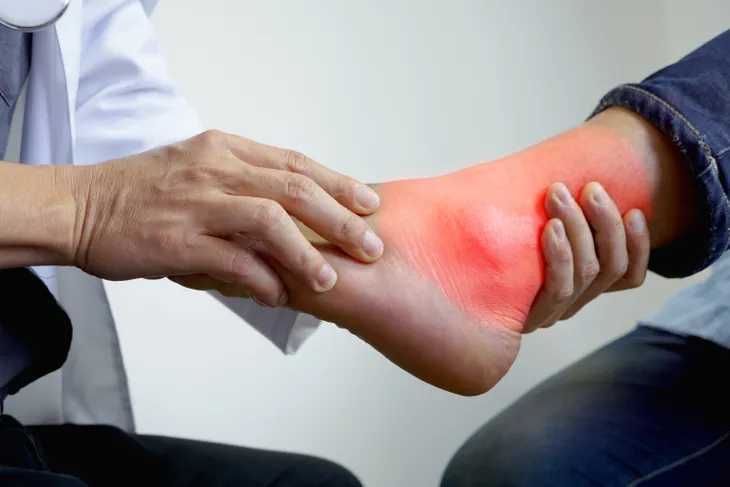- Edema is the medical term used to describe swelling caused by excess fluid in the body.
- There are several types of edema, depending on the area affected and the underlying cause.
- Edema is always a symptom of another health issue, many of which are critical or life-threatening.
- The best way to prevent or treat edema is a healthy diet and improved cardiovascular health.
If you’ve ever spent all night dancing only to wake up to pink and puffy feet, you have experienced edema. A form of bodily swelling, edema has a variety of causes. Many of those causes are common, even among healthy people, and mostly harmless. But certain types of edema can also indicate serious health issues and should never be ignored.
Here’s a comprehensive look at what edema is, the common symptoms to look out for, and the different types. We’ll also find out what causes it and what you can do about it.
Edema and Your Health
Edema broadly describes any swelling or bloating caused by excess fluid trapped in body tissues. Almost everyone experiences some form of edema at some point or another. For example, intense exercise, or a long day spent sitting or standing can leave you with some swelling in your legs and ankles.
But edema can also indicate serious health issues or, in some cases, medical emergencies. If you’re experiencing swelling in any area of your body that has no apparent cause, or widespread swelling across your entire body, seek medical attention immediately.
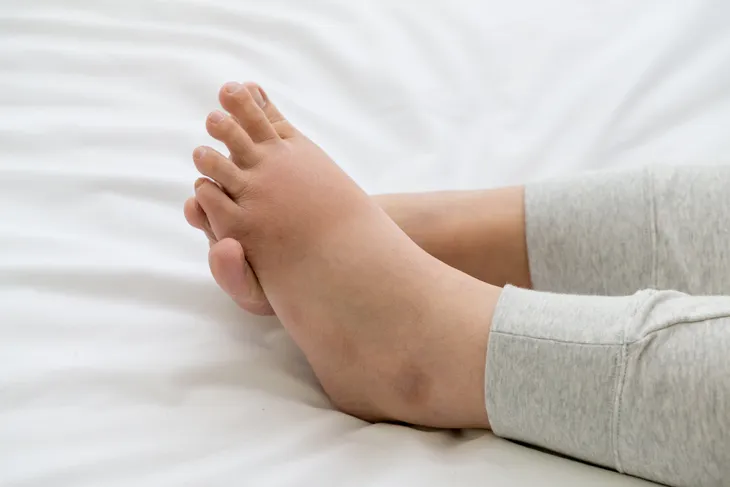 comzeal images / Shutterstock
comzeal images / ShutterstockWhy Edema Occurs
Edema in any form isn’t a condition that occurs on its own. Rather, it indicates another underlying issue. In many cases, the underlying issues are minor. For example, swelling from physical injuries, bug bites and burns are all forms of edema. Many women also experience edema during pregnancy and menopause.
Other minor causes of edema include:
- Hormonal contraceptives
- Certain medications
- Long periods of sitting or standing, especially at high altitudes or in excess heat
- Eating a sodium-heavy meal
But certain kinds of edema also indicate serious health problems. Congestive heart failure, kidney disease, and liver disease are just a few of the serious health problems that cause edema.
Generalized and Localized Edema
Edema occurs in one of two ways. When swelling is confined to one or two areas of your body, such as your lower legs and ankles, it’s called localized edema. It’s most common in your hands, arms, legs, feet, and ankles, though localized edema can occur anywhere in the body, depending on the underlying cause.
When swelling from excess fluid reaches several parts of the body simultaneously, it’s referred to as generalized edema, anasarca, or massive edema. The swelling from anasarca is significant, often inhibiting movement. It almost always indicates a severe health issue, such as organ damage, malnutrition, or a severe allergic reaction. Massive edema is a medical emergency that requires immediate attention.
Types of Edema
Edema is classified into different categories depending on the underlying cause. Typical edema describes the swelling most people are familiar with, such as puffiness or bloating caused by an injury or physical stress. This form of edema usually poses minimal health risks.
Other types of edema, such as myxedema and lymphedema, usually indicate serious health problems. Mixademo, which is swelling around the face and eyes, is caused by hormonal imbalances and some medical treatments. Lymphedema is swelling from excess lymph nodal fluid, usually caused by lymph node damage or removal during cancer treatment.
Where Edema Occurs in the Body
Edema is also classified by where it occurs in the body. Swelling that affects the feet, ankles, legs, arms, and hands is known as peripheral edema. Meanwhile, puffiness around the eyes is called periorbital edema.
Since edema describes a buildup of excess fluid in the body, it can also occur internally with no visible swelling. A buildup of fluid in the lungs, which can cause trouble breathing, is referred to as pulmonary edema. It’s often the result of congestive heart failure or an acute lung injury and is a serious medical emergency.
Excess fluid in the brain is called cerebral edema. Symptoms include headache, neck pain, dizziness, or changes in mental states. Cerebral edemas occur for various reasons, but they’re always life-threatening emergencies.
Diseases Related to Edema
Certain diseases and medical conditions contribute to the appearance of edema. In addition to congestive heart failure, edema is common in those with other heart problems. When the heart isn’t pumping blood properly, the blood can pool in the limbs, causing peripheral edema.
Edema is also common in those with kidney disease, liver problems, cirrhosis, thyroid disease, and chronic lung disease. People with diabetes are equally at risk for, as are individuals with severe varicose veins, cysts, tumors, and blood clots all increase the chances of edema.
 Shutterstock/lenetstan
Shutterstock/lenetstanWhen Edema Appears
To reiterate, edema is a symptom of another health issue. If you’re experiencing swelling or bloating in any part of your body that has no apparent explanation, it’s critical to consult a doctor since it could indicate a serious problem.
That said, edema is common, even in healthy individuals. Hot and cold weather, high altitudes, and extended periods without mobility can all cause edema. If you’re coming off an extended flight and feeling a little puffy, get your blood moving with some light exercise.
Sodium and alcohol also cause edema. If you’re feeling bloated after a night out or after eating an extra salty meal, focus on eating healthy, whole foods and drinking plenty of water to rehydrate.
Edema Prevention
Diet and exercise play an outsized role in the prevention of edema. Malnutrition, excess sodium, and low intake of vitamins B1, B5, and B6 can all cause bloating and swelling. Eating plenty of healthy, whole foods and drinking plenty of water helps prevent even minor cases of edema.
Exercise is also important since edema often occurs due to poor circulation caused by a sedentary lifestyle or prolonged immobility. Cardiovascular exercise is especially important for office workers. A quick jaunt around the office every hour or so, or even a standing desk, can lead to significant health benefits.
Treating Edema
Treating edema involves treating the underlying issue that’s causing it. If edema is the result of a serious issue or chronic disease, you should consult your primary care doctor and follow their guidance.
If you’re otherwise healthy but suffer from peripheral edema, the best long-term treatment is improved diet and cardiovascular health.
Most everyone has taken a fall, twisted an ankle, or jammed a wrist. For moderate sprains, swelling can occur several hours after the injury and last for up to 48-hours. And like other occurrences of edema, treatment for this type of swelling involves taking care of the underlying problem.
Addressing Pain
That said, swelling caused by edema can be painful. Rather than taking over-the-counter pain medication, which can worsen edema, consider visiting a massage therapist. It’s great for relieving stress and helps increase circulation, easing symptoms of edema.
If the edema is from a known injury, plenty of rest is in order so healing can happen. A wrap or compress will help ease swelling, as will an ice pack. If the swelling hasn’t subsided after a day or two, it’s a good idea to visit your doctor.
Treatment for Ongoing or Situational Edema
For those with ongoing or situational edema, such as pregnant women or people who spend a lot of time on their feet, a few simple strategies can offset excess swelling and bloating. The most important of which is investing in comfortable, well-fitted shoes, socks, and clothes that don’t inhibit circulation. Compression socks, popular among nurses who spend long hours on their feet, help decrease swelling and boost leg circulation.
Likewise, taking time to stretch and rotate your feet and ankles improves circulation, as does taking a few minutes to elevate your feet and legs.
When to See a Doctor About Edema
It’s normal to experience a little swelling on occasion. Puffy feet after an all-day hike is no surprise, especially if you’ve been off the trail for a few months. Conversely, a long road in a tiny car can leave you feeling a little bloated. Assuming good health, the edema in these situations is short-lived.
But in other cases, edema can indicate serious health problems that shouldn’t be ignored. Even for those in excellent health, a sudden onset of swelling in any part of the body is cause for concern.
In short, if there’s a reason for the swelling, and the swelling is reasonable, you’re probably fine. But if not, don’t second guess what your edema is telling you, and go see your doctor.
 S_L / Shutterstock
S_L / Shutterstock